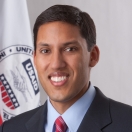
At the Yemen Donor Conference in Riyadh, which I attended on September 4, I was impressed by how far Yemen has come in the past year. But I think what really made this conference stand out is that we focused on what happens after the conference, and how key “quick impact” programs will benefit from the commitments made and deliver the greatest impact to the most critical challenges facing Yemen.
Last year, Yemen negotiated a political solution that allowed the country to pull itself from the brink of conflict and begin implementing long-overdue political, military, and economic reforms. Yet Yemen is embarking on this promising path under the shadow of significant challenges, including nearly 40 percent unemployment and a dire humanitarian crisis in which ten million people – nearly half of Yemen’s population – go to bed hungry every night. And, Sana’a, Yemen’s capital, could potentially run out of water in a decade.
The Yemeni government’s “Transitional Program for Stabilization and Development” – which was presented at the conference – describes plans to rebuild the economy, advance the political transition, enhance security and the rule of law, and significantly improve the welfare of the Yemeni population. At the conference, Yemen agreed to a “Mutual Accountability Framework,” which outlines the relationship between Yemeni goals to restore political, security and economic stability and the supporting role of donor countries.
Yemen cannot carry out its ambitious agenda without significant international support. The Donor Conference, hosted in Riyadh by Saudi Arabia, the World Bank and the Yemeni government, was critical to rallying this support and strengthening donor coordination. During the conference, partner countries pledged nearly 6 billion dollars and I had the opportunity to emphasize the strong commitment of the United States as a friend and partner to Yemen during this incredibly important time.
Supporting Yemen’s transition is a priority for the United States. To do our part, the United States is providing both immediate assistance in response to the humanitarian crisis and longer-term support to help lay the foundation for a stable, prosperous and democratic Yemen. This year alone, the United States is providing $346 million in security, humanitarian, and development assistance to Yemen – more than double what we provided last year.
More than half of what the United States is providing this year, $185 million, is for political transition, humanitarian, and development assistance. Of the $185 million, $117 million is for humanitarian relief, making the United States the single largest provider of humanitarian support to Yemen. The UN estimates that Yemen will need $585 million to get through this humanitarian crisis, but the UN humanitarian appeal is less than 50 percent funded. We urge all nations to generously give to the UN’s appeal for Yemen.
When I visited Yemen in June, I was able to see first-hand the critical impact of our development and humanitarians efforts. To address hunger, our aid has helped feed 415,000 Yemeni people and trained nearly 5,000 famers in good crop production and livestock management practices so they don’t have to rely on food aid. I visited Zinjibar in southern Yemen, where our partnerships are helping rehabilitate schools, clinics, and other public buildings, as well as supporting the recovery of vital public services, including power and water. Our work also allowed 780,000 Yemenis to benefit from quality medical services at Red Crescent facilities that we refurbished.
Ultimately, we know that solutions to the humanitarian crisis and the nation’s pressing economic and security challenges can only be realized through the development of effective, responsive, and accountable institutions and an inclusive and transparent political system.
The foundations for such institutions and systems will be laid through Yemen’s upcoming National Dialogue Conference. To help prepare Yemeni civil society for participation in the Dialogue, the U.S. Agency for International Development has launched a training academy for 165 civil society organizations, and we have trained nearly 2000 youth in civic engagement.
It is an exciting moment for Yemen, as the Yemeni people come together to resolve some of the most difficult problems that have held their country back, write a new constitution, and build a new future.
Real challenges remain, however, not least of which includes responding to the pressing needs of millions of vulnerable people so that Yemen can successfully undertake the transition it has begun.
But as I saw during my visit to Yemen in June – and as made clear by the Donor Conference– there is real reason to be hopeful as citizens across Yemen take up the call to chart their own nation’s development. The United States is a proud partner in those efforts.


